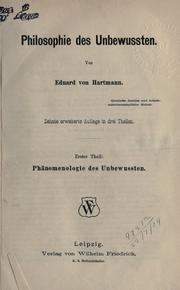Philosophy of the Unconscious
 |
|
| Author | Eduard von Hartmann |
|---|---|
| Original title | Philosophie des Unbewussten |
| Translator | W. C. Coupland |
| Country | Germany |
| Language | German |
| Subject | Unconscious mind |
| Published |
|
| Media type | Print (Hardcover and Paperback) |
| ISBN | |
Philosophy of the Unconscious: Speculative Results According to the Induction Method of the Physical Sciences (German: Philosophie des Unbewussten) is an 1869 book by Eduard von Hartmann. The culmination of the speculations and findings of German romantic philosophy in the first two-thirds of the 19th century, Philosophy of the Unconscious became famous. By 1882, it had appeared in nine editions. A three volume English translation appeared in 1884. The English translation is more than 1100 pages long. The work influenced Sigmund Freud's and Carl Jung's theories of the unconscious.
Hartmann reviews the work of many German philosophers and discusses the ideas of the Indian Vedas, as well as collecting facts about perception, the association of ideas, wit, emotional life, instinct, personality traits, individual destiny, and the role of the unconscious in language, religion, history, and social life. He refers to what Jakob Böhme, Friedrich von Schelling, and Arthur Schopenhauer had called the will as the unconscious. As part of his attempt to reconcile Schopenhauer, Georg Wilhelm Friedrich Hegel, and Gottfried Wilhelm Leibniz, and other philosophers he argues that the unconscious Absolute is both will and idea, which respectively account for the existence of the world and its orderly nature. Will appears in suffering, idea in order and consciousness. Thus there are grounds for both pessimism and optimism, and, since the Absolute is one, these must be reconciled. As the cosmic process advances, idea prevails over will, making aesthetic and intellectual pleasures possible. Yet intellectual development increases our capacity for pain and material progress suppresses spiritual values. Hence ultimate happiness is unattainable on Earth or heaven, or by progress towards an earthly paradise. These illusions are ruses employed by the absolute to induce mankind to propagate itself. We will eventually shed illusions and commit collective suicide, the final triumph of idea over will.
...
Wikipedia
